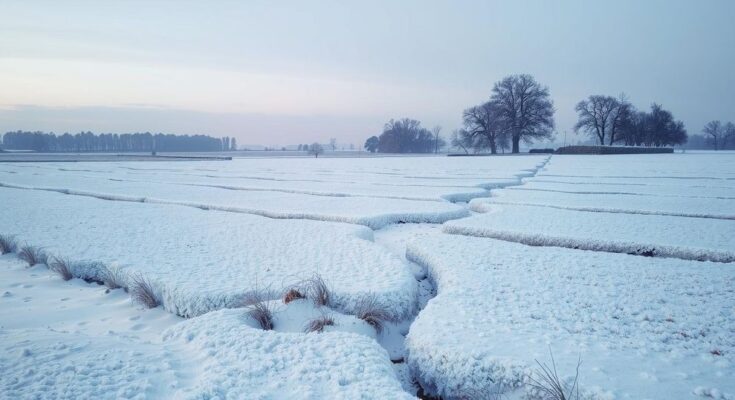Climate change is threatening winter crops in Rajshahi, particularly vegetables, leading to serious implications for food security and farmer livelihoods. Key figures highlight the need for urgent measures and the protection of farmers’ rights. Research indicates that changing temperatures and rainfall patterns are impacting crop yields. The situation requires immediate attention to mitigate adverse effects on agriculture and ensure sustainable food production.
Climate change is increasingly threatening winter crop farming in Rajshahi, particularly affecting vegetable production. The winter season has intensified and shortened over recent years, impacting the livelihoods of farmers reliant on these crops. Urgent measures are essential to enhance agricultural output for food security in light of ongoing climatic challenges.
Abdur Rahim, a successful farmer from Bargachhi village, expressed that rapid climate change has adversely affected the diversity of winter vegetable farming, jeopardizing food security. He urged developed nations to fulfill their climate funding commitments and emphasized the need to protect farmers’ rights to encourage increased agricultural production to meet rising demands.
Shahidul Islam, a coordinator for BARCIK, highlighted that the current agricultural framework faces significant threats due to climate change and related natural disasters. He pointed out that the implications of climate change on water resources, especially in the Barind tract, are alarming and require immediate attention.
Research by Prof. Chowdhury Sarwar Jahan from Rajshahi University indicates that maximum temperatures have positively influenced the yield of certain crops while adversely affecting others, such as Boro and wheat. Simultaneously, a reduction in agricultural land for crops like rice and sugarcane has been noted, while areas for potato and wheat are increasing, raising concerns about food security in drought-prone areas.
Prof. Osman Gani Talukder, Vice-Chancellor of Varendra University, called for necessary actions to mitigate climate change effects on local livelihoods and agricultural productivity. He stated that every agricultural sector is at risk, particularly agriculture, livestock, and fisheries, creating substantial threats to food production in the region.
Prof. Laila Arzuman Banu of Rajshahi University discussed the onset of adverse drought effects including dust storms, diminished crop yields due to insufficient irrigation water, malnutrition, and habitat damage. Currently, over 16,000 deep tube wells are operating to extract groundwater essential for sustaining irrigation-dependent paddy outputs, vital for feeding the growing population.
The increasing frequency of natural calamities due to climate change has emerged as a severe challenge for agricultural practices in Rajshahi. The alterations in winter duration and intensity threaten the cultivation of winter crops, particularly vegetables. This situation endangers food security and farmers’ living conditions, necessitating prompt action to ensure sustainable agriculture in the face of changing climatic patterns.
In conclusion, climate change poses a grave risk to winter crop agriculture in Rajshahi, affecting not only production but also food security. Farmers advocate for enhanced protection of their rights and call upon developed nations to uphold their climate funding commitments. Urgent measures are required to adapt agricultural practices to withstand the adverse impacts of climate change, particularly in vulnerable regions like the Barind tract.
Original Source: www.bssnews.net




